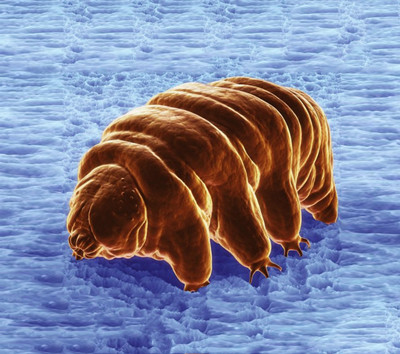(单词翻译:单击)
听力文本
This is Scientific American — 60-Second Science. I'm Lee Billings.
Go a minute?
Forget cockroaches. Forget Superman. Forget any other tough-as-nails creatures you've ever heard of. The most indestructible multicellular organisms on Earth are undoubtedly tardigrades—microscopic eight-legged aquatic invertebrates also known as water bears.
These wee beasties can withstand severe dehydration, extreme temperatures and pressures, several days in Earth orbit exposed to the vacuum of space, and whopping doses of radiation that would kill most anything else. And, being Earthlings, there's no reason to think they'd be vulnerable to kryptonite.
Scientists are beginning to understand the genetic basis of tardigrades' death-defying superpowers. And what they're learning may have profound implications for human health.
The genome for a species of tardigrade was first sequenced last year. The analysis suggested that about one-sixth of the DNA was imported from notoriously hard-to-kill bacteria—but that conclusion was soon disputed, with all that bacterial DNA blamed on laboratory contamination.

Now, a new genome has been published of an exceptionally hardy tardigrade species. And it finds that almost all of the DNA is homegrown—and chock-full of sequences responsible for cellular protection and repair. The study is in the journal Nature Communications.
In particular, the researchers discovered the gene for a protein apparently unique to water bears that shields their DNA from radiation damage. Called "DSup" for "damage suppressor", the protein binds to tardigrade DNA to keep it from snapping apart when bombarded by x-rays and other harsh radiation. The protein's protective effects against radiation may be a by-product of the tardigrades' resistance to dehydration, which causes similar damage to cells.
The most remarkable thing about the Dsup protein, though, is that it also seems to work in other organisms—including humans. When the researchers inserted Dsup into cultured human kidney cells, the protein boosted the cells' tolerance to x-ray damage by about 40 percent.
In theory, Dsup or something much like it could protect workers at nuclear power plants, cancer patients receiving radiation therapy or astronauts on interplanetary voyages. For now, the ethics and practicality of genetic engineering make such applications highly speculative. But, just maybe, if human beings someday stand on the surface of Mars, they could have water bear DNA to thank for helping them survive.
Thanks for the minute for Scientific American — 60-Second Science Science. I'm Lee Billings.
参考译文
这里是科学美国人——60秒科学。我是李·比林斯。
有一分钟时间吗?
忘掉蟑螂。忘掉超人。忘掉你听说过的所有顽强的甲壳类动物。毫无疑问,地球上最坚不可摧的多细胞生物是缓步类动物——这种微小的8只腿的水生无脊椎动物也被称之为水熊。
这种生物可以承受重度脱水、极端温度和压力、暴露在地球轨道真空数日以及可以杀死几乎所有生物的重度辐射。作为地球人,我们没有理由认为它们会屈服于克星。
科学家开始研究这种缓步类动物不畏惧死亡的超级强权背后的基因基础。科学家的研究可能对人类健康产生深远的影响。
去年科学家首次排列出了缓步动物的基因组。分析表明,缓步类动物有六分之一的DNA来自那些难以消灭的细菌,但是,这一结论很快就引发了争论,因为所有这些细菌DNA都是由实验室污染所致。
现在,在异常顽强的水熊基因中发现了一种新的基因组。研究发现,几乎所有的DNA都是自生的,这些基因序列负责细胞保护和修复。这项研究结果发表在《自然通讯》期刊上。
特别是,研究人员发现水熊有一种可以保护其DNA免受辐射伤害的独特蛋白质。这被称为“伤害抑制”,简称DSup,这种蛋白质与水熊的DNA结合,在水熊遭受x射线攻击或其他恶劣辐射侵袭时,这种结合可防止蛋白质的结构被破坏。这种蛋白质抗击辐射的保护功能可能是水熊耐脱水的副产物,因为耐脱水也会对细胞造成类似的伤害。
这种Dsup蛋白质最引人注意的地方是,它在包括人类在内的其他生物身上也可以起作用。研究人员将这种蛋白质插入人体的肾细胞进行培养,这种蛋白质将肾细胞对x射线的承受力提高了40%。
理论上,Dusp或其类似物质可以保护在核电站的工作人员、接受放射治疗的癌症病人,以及在星际航行的宇航员。目前,基因工程的伦理标准和实用性让这种应用具有高投机性。但是,如果有一天人类能站在火星的表面,那他们就可以用水熊的DNA来帮助他们生存下去。
谢谢大家收听科学美国人——60秒科学。我是李·比林斯。
译文为可可英语翻译,未经授权请勿转载!
重点讲解
重点讲解:
1. be vulnerable to 易受伤害的;易受影响的;
例句:Migrant workers are vulnerable to exploitation.
流动工人易受剥削。
2. in particular 尤其;特别;
例句:They chat about nothing in particular.
他们随便闲聊,没谈什么特别的事。
3. keep sb. from doing sth. 阻止(或防止、阻碍)…做;
例句:The turkey is basted to keep it from drying out.
烤火鸡时润以油脂以免烤干。
4. in theory 从理论上说;照理说;
例句:In theory, nothing would seem to prevent us from getting there.
从理论上来说,没有什么可以阻止我们达到这一目标。


